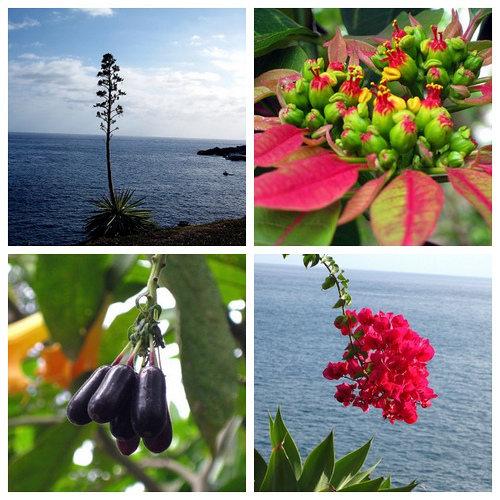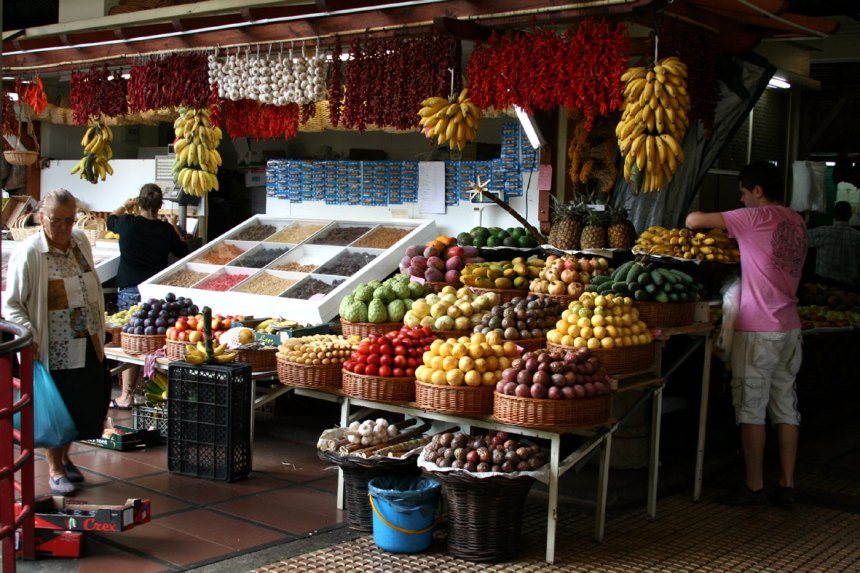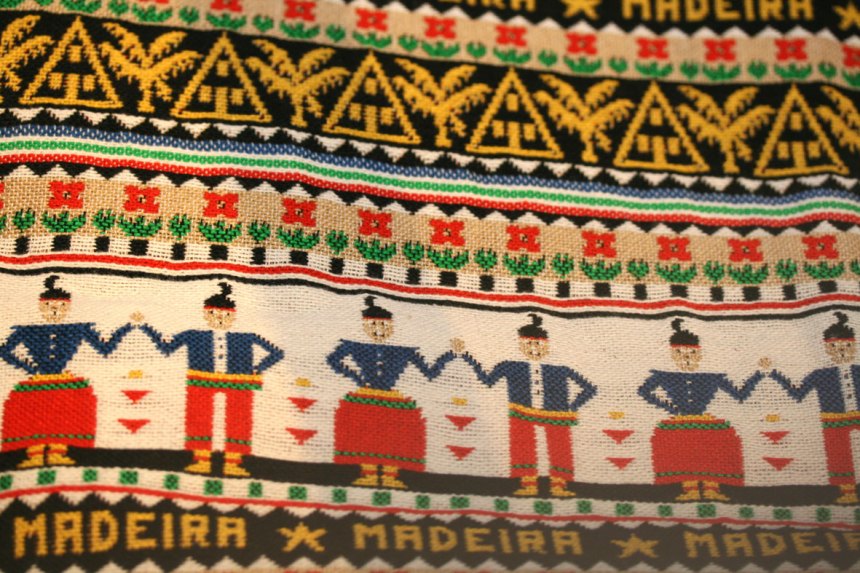“. . .as this place differs so vastly from anything thou hast ever seen, I make no doubt thou will be agreeably entertained with the many romantic prospects, whimsical houses, pleasant cool gardens, and amazing precipices. . .” (Deborah Hill to her son Richard, Funchal, Madeira, May 1st, 1743)
My only previous experience of Madeira was through the letters of Deborah Hill and her relatives — eighteenth-century Quakers who, like many other merchant families of their class, made their fortunes in the transatlantic wine trade. Though they are more than 250 years old, Deborah Hill’s letters still convey an accurate impression of Madeira — both in terms of the insistent presence of the British on the island, as well as it’s “romantic prospects and amazing precipices.”
Our idea was to enjoy these prospects through some serious mountain and levada walking (the levadas are an incredible architectural system of canals criss-crossing the island and carrying water from the cloud-capped mountaintops down to the vineyards and plantations) but Tom’s accident rather scuppered these plans. So instead we engaged in some less precipitous but no less restorative activities — involving lots of sunshine, tasty food, low-level walking, and (for me) lots of swimming too.
We really enjoyed Madeira’s colourful fauna . . .
. . . and flora
. . .and I have a fondness, bordering on an obsession, with Portuguese cuisine. There are many, many things I like about it (tisanes, for example — the Portuguese make a fine cup of tea) but my two favourite things are grilled sardines and custard tarts (pasteis de nata). I tend not to consume these items simultaneously, (though who knows what I might do in a moment of gastronomic over-excitement) but I did manage to eat both on a number of separate occasions while we were away.

(tasty grilled sardines at O Barqueiro. So very good — I bored Tom with sardine raptures for days)

(you see here several varieties of pasteis — coconut, walnut, apple, almond– but the custards, pictured to the top right in the first photo, are my confirmed favourite)
The range and quality of fresh Madeiran produce is really amazing. I shan’t go on about the four different varieties of passion fruit we tried or the wonderful straight bananas, but certainly our Scottish neeps and tatties were made to seem rather dull and prosaic in the face of such abundance.
Being sedentary sunshine tourists was a new experience for Tom and I — our holidays are usually a bit more, um, strenuous, and are spent in Britain or Ireland. I am not really very fond of being a Brit abroad, and I find it particularly weird and difficult somewhere like Madeira or the Caribbean, where there is evidence of the British exploitation of local resources and labour everywhere you look (I’m thinking of eighteenth/nineteenth-century commerce as well as contemporary tourism). It is perhaps possible to assuage such cultural-imperialist guilt through an appreciation of – and engagement with – a foreign landscape, such as that which one gets from walking. But it is hard to throw off one’s tourist-ness when one cannot get up into the mountains. And it is well-nigh impossible to stop feeling like a guilty British tourist when one is surrounded by large numbers of other tourists — dare I say it — of a certain age.
I do not often spend much time with large groups of British octogenarians, and I don’t wish to sound churlish or mean, but there are a few observations about their group behaviour that unavoidably and repeatedly strike one in such situations. The first is just how berloody grumpy they can be. This constitutional grumpiness seems to lead them to assume that, even in the peaceful, beautiful and near-idyllic settings Madeira affords, that everyone else is having a slightly better time than they are. In a restaurant full of elderly British tourists you can literally feel the pairs of beady eyes darting about suspiciously: did those people get served before me? Are they perhaps sat at a better table? Another impulse, closely associated with the assumption that everyone else is having a Slightly Better Time Than You is to ensure that you are Having the Best Time You Possibly Can Under the Circumstances. This impulse leads individuals whose usual pace is probably under half a mile an hour to move at incredible speed when it comes to being the first on a bus. Normally, this would have amused me, but it was actually rather stressful when accompanied by someone with a still painful, serious and rather fragile injury. I was strongly put in mind of comments toward the end of this post in which a heavily pregnant person is repeatedly bombarded by a marauding elderly mob eager to get to the quilting fabric.
Still, being a tourist has its benefits — one of which is being able to acquire a couple of metres of some superbly cheesy, but also pleasing, fabric that only a tourist would buy.
Do you think I can get away with wearing a skirt made from this stuff? I do hope so.
More about Madeiran embroidery tomorrow.






I am portuguese and I love your photos and writing about the pasteis de nata, etc. So cool to see how you see our culture! The Madeira embroidery is very well known, as the Castelo Branco embroidery, and Viana’s embroidery also. They are different.
Cool blog, it will be ate my fav’s!
Best regards!
LikeLike
Mum and I have talked before about going to Maderia – I think we worried that it would be full of blue-rinse people but it does look stunning in your photos and I love the idea of a restorative gentle holiday involving swimming. Although your initial plans also sounded grand too. The fabric will make a wicked skirt – can’t wait to see it.xx
LikeLike
I think a skirt made from this fabric would be fantastic. You go girl!
LikeLike
love the critters, the grilled sardines, the portuguese, who are wonderful, and the embroidery!
HAVE SOME MADEIRA, M’DEAR
Flanders and Swann
She was young, she was pure, she was new, she was nice,
She was fair, she was sweet seventeen.
He was old, he was vile, and no stranger to vice,
He was base, he was bad, he was mean.
He had slyly inveigled her up to his flat
To view his collection of stamps
And he said as he hastened to put out the cat,
the wine, his cigar and the lamps:
‘Have some madeira, M’dear
You really have nothing to fear
I’m not trying to tempt you, that wouldn’t be right
You shouldn’t drink spirits at this time of night
Have some madeira, M’dear
It’s very much nicer than beer
I don’t care for sherry, one cannot drink stout
and port is a wine I can well do without
It’s simply a case of Chacun ð son gout
Have some madeira, M’dear!’
Unaware of the wiles of the snake in the grass
The fate of the maiden who topes
She lowered her standards by raising her glass
Her courage, her eyes and his hopes
She sipped it, she drank it, she drained it, she did
He quietly refilled it again
And he said, as he secretly carved one more notch
on the butt of his gold-handled cane;
‘Have some Madeira, M’dear
I’ve got a small cask of it here.
And once it’s been opened, you know it won’t keep
Do finish it off, it’ll help you to sleep
Have some Madeira, M’dear
It’s really an excellent year
Now if it were Gin you’d be wrong to say yes
The evil gin does would be hard to assess
Besides, it’s inclined to affect me prowess
Have some Madeira, M’dear!’
Then it flashed through her mind what her mother has said
with her antepenultimate breath;
‘Oh, My child, is you look on the wine that is red
then prepare for a fate worse than death!’
She let go the glass with a shrill little cry
Crash! Tinkle! It fell to the floor
When he asked ‘What in heaven?’ she made no reply,
Up her mind, and a dash for the door.
‘Have some Madeira, M’dear’
Rang out down the hall, loud and clear
A tremulous cry that was filled with despair
As she paused to take breath in the cool midnight air,
‘Have some Madeira, M’dear!’
The words seemed to ring in her ear,
Until the next morning, she woke up in bed
With a smile on her lips and an ache in her head
And a beard in her earhole that tickled and said
‘Have some Madeira, M’dear!’
LikeLike
Make the skirt – Make it!
LikeLike
So nice to read your impressions on Portugal (even if Madeira is so far from the rest of the country). Being a fan of pastéis de nata, I highly recommend this book: Fabrico Próprio (in Portuguese and English).
LikeLike
You can’t imagine how glad i am reading this. I am from Madeira and lived there for 18 years. I always return for the levadas walking, because when i was a child, everytime i wanted to go to my grandmother’s house, i had to walk 30 minutes in a levada. And the photo from Mercado dos Lavradores (farmers market) brings me back so many memories. I used to go there with my parents to buy fruit and fish. In Xmas, in the 23rd December, the market is open all night long (http://www.madeirahelp.com/market_place_night_funchal)
LikeLike
What fabulous pictures. I love, love, love your sweater in the previous post too.
LikeLike
I share many of your feelings about being a tourist abroad.
I hope it is possible to assuage some of the cultural-imperialist guilt by engaging respectfully and appreciatively with a foreign place… I had many feelings similar to yours whilst abroad in Italy.
I didn’t get marauded on by English grannies though.
I think your fabric is going to make an amazing skirt and I share your rapture for sardines and custard tarts.
I hope Tom has been restored by the holiday and your photos are lovely.
Big Joy to you xxx
LikeLike
The cafe attached to the Guardian Newsroom in Farringdon Road in London EC1 (the Guardian newspaper’s archive, exhibition space and classroom) sells the most fantastic Portuguese custard tarts. We’re off there on Saturday for a ‘Big Draw’ cartooning event with the kids and my mouth is already watering! A dozen years ago (before kids) my partner and I walked the pilgrim route to Santiago de Compostela and in that northern corner of Spain the food is terrific. I particularly remember the tuna filled pastries. I’m afraid the Scotch pie just can’t compete.
LikeLike
mmmm….and i what about those dishes with chorizo and clams, and the bread, and…..getting hungry just looking at the pics!
LikeLike
:) Good to know that you had a good time in Madeira!
About the pasteis de nata have you try them with a bit of cinnamon? To me is even better (if that is possible!); Funny enough I have just had one, in Glasgow I have found 2 Deli that sell them.
LikeLike
Lovely photos. Glad you got to enjoy Madeira if from a rather sedentary point of view – can we have an update on Tom’s condition?
LikeLike
I hope you were welcomed in Portugal! And if you enjoyed Madeira, I bet you would like even more Azores. Imagine, 9 islands lost in the middle of the ocean… :)
LikeLike
Looks absolutely lovely! I can’t wait to see the skirt.
LikeLike